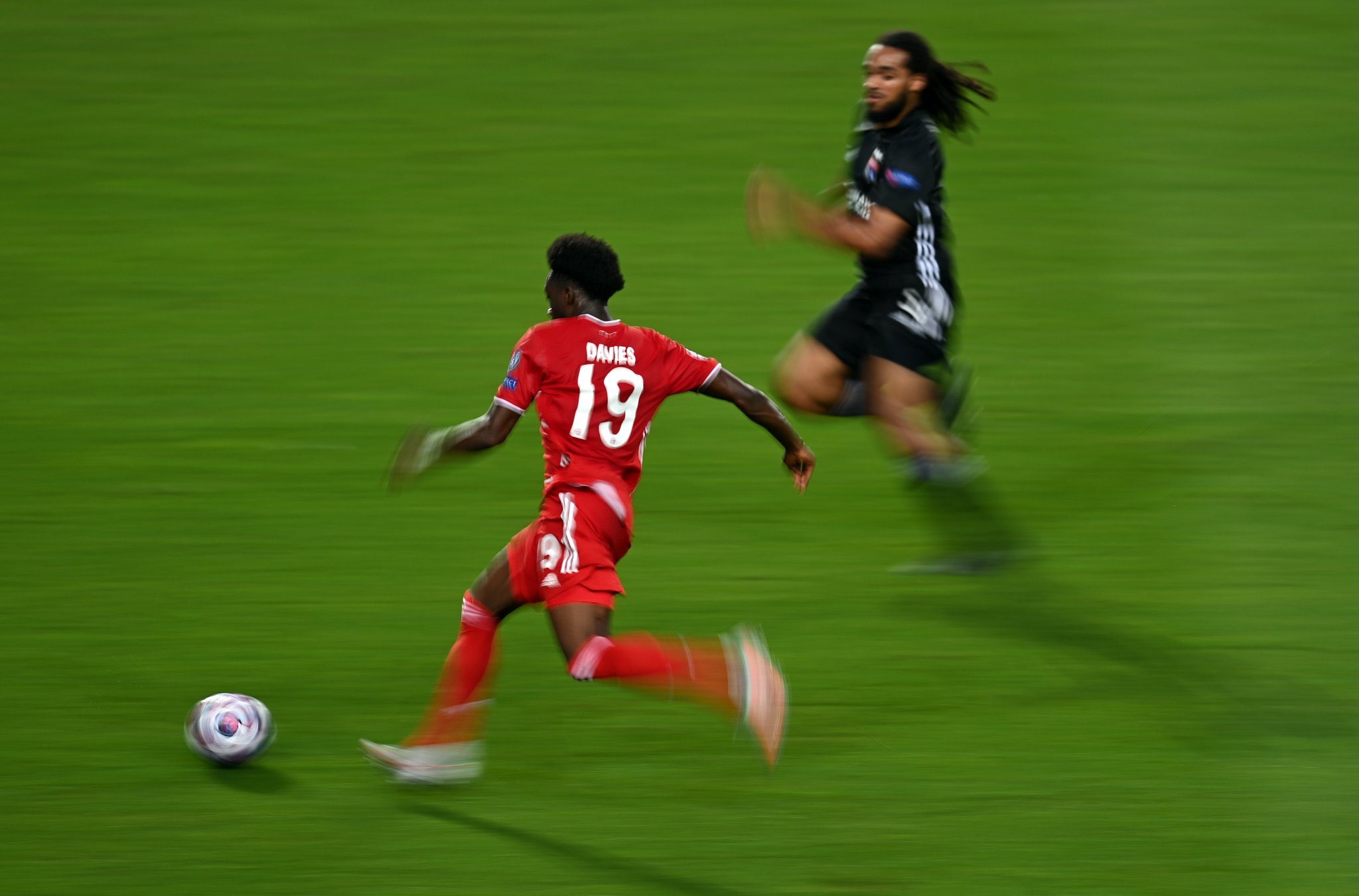The sensational emergence of Alphonso Davies over the past season has been a real breath of fresh air, a feel-good story every football fan can appreciate. Of course he’s not the only Canadian making waves, with fellow-countryman Jonathan David’s €30 million summer transfer to Lille drawing a lot of media attention.
Equally, Canadian women’s football has progressed rapidly of late – epitomised by Olympic Lyonnais’ Kadeisha Buchanan lifting her fourth Champions League trophy in five seasons following their 3-1 victory over Wolfsburg last Sunday.
Indeed there is a plethora of young female Canadian talent emerging across Europe at the moment. Lyon’s semi-final opponents, PSG, have the next big thing on their books in the form of towering 19 year-old striker Jordyn Huitema – who also happens to be Alphonso Davies’ girlfriend.
The Canucks, as Canadians are colloquially known, have long been considered, alongside their southern neighbours, as a fledgling football nation. It seems that label is now becoming rather outmoded.
With the future looking bright for the Canadian women and men’s teams, let’s take a look back at the Canadians that paved the way for future successes in the Europe. The following are a collection of trailblazers who have demonstrated that football is a truly global game.
The Earliest Pioneers
Canadian football has a rather deeper and more illustrious history than one might first assume. In the fall of 1888 a team compromised of players from the Western Football Association of Ontario toured Britain, becoming the first international team to do so. Below are some of the earliest examples of Canadians who crossed the Atlantic in the pursuit of glory.
Edward Hagarty Parry
More than a century before Canadian-born England international Owen Hargreaves, there was the pioneering Edward Parry.
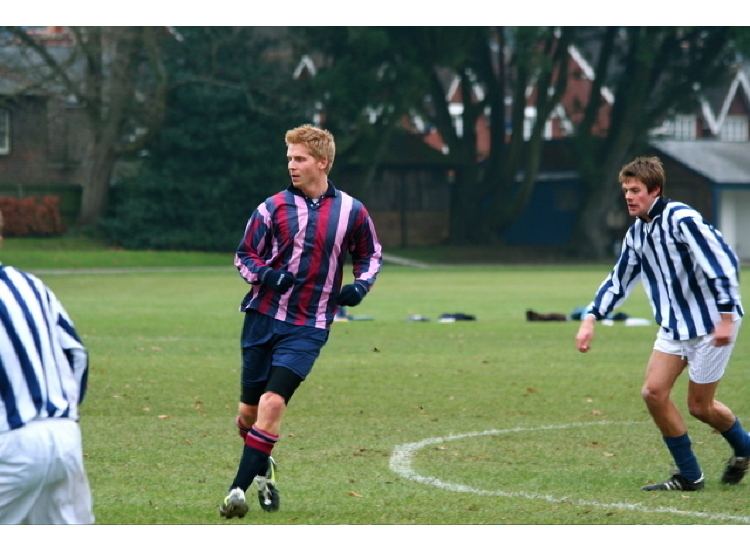
Toronto native Parry moved to England at a young age, and while a student at Oxford University captained the college team that lost in the 1877 FA Cup final – a 2-1 defeat at the hands of south-east London club, Wanderers. In 1881 Parry had another crack at FA Cup glory, captaining Surrey side Old Carthusians to a 3-0 victory over Berkshire club Old Etonians.
In doing so, Parry, an attacking player known for his mazy dribbling, became both the first Canadian to win an FA Cup, and the first non-UK player to captain an FA Cup winning team.
The Natural born leader did not go unnoticed by the FA and he received a call-up to the England squad, making his debut versus Wales in 1879. He would go-on to make two further appearances for England – against Wales and Scotland in 1882.
Joe Kennaway
Originally from Point St. Charles, Montreal, James T. Kennaway was a dual international who played for both Canada and Scotland between 1926 and 1933.
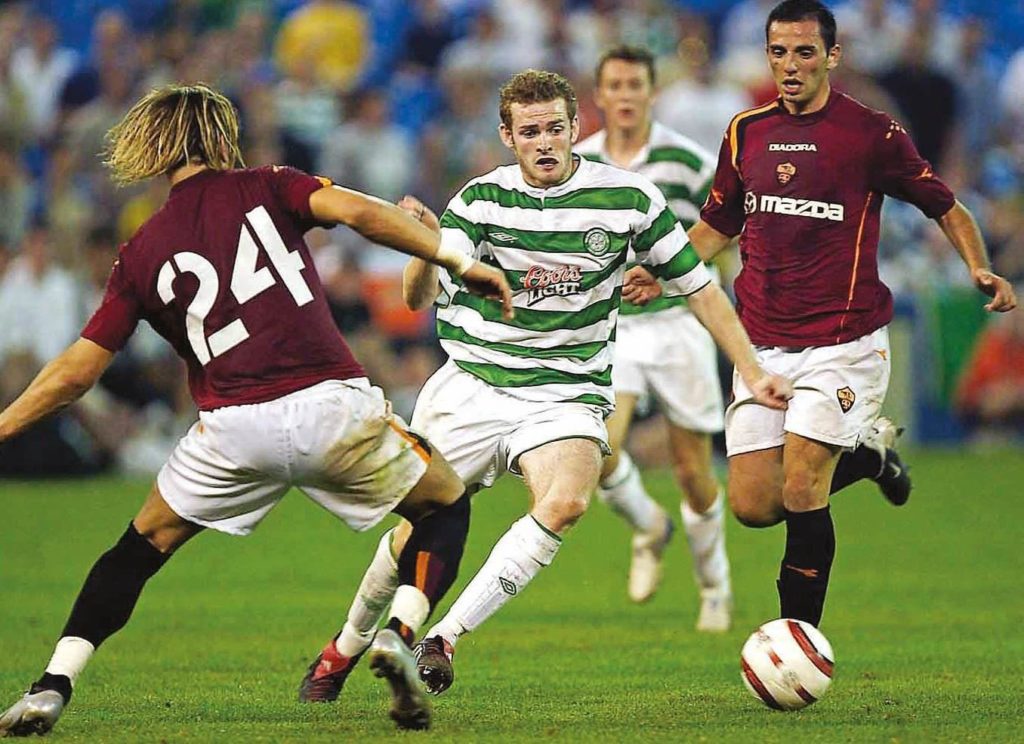
Regarded as one of the best goalkeepers of his generation, Kennaway crossed the pond in 1931, joining Scottish giants Glasgow Celtic – where he won the Scottish League championship twice and the Scottish Football Association Cup three times.
In 1926 Kennaway appeared for Canada against the United States, but would also feature once for Scotland, versus Austria in 1933 at Hampden Park. On retiring, he coached at Brown University in Providence, Rhode Island.
European Invasion
In the 80’s and 90’s football became more globalised, and Europe saw an influx of Canadian talent like never before. Transfer policies at clubs became more unfettered and scouting networks were expanded further afield in search of hidden gems. Gems such as:
Craig Forrest
British Columbian Forrest was invited to Europe by Ipswich Town in 1985, joining his compatriot and fellow club legend Frank Yallop who had been at the club since 1983. Goalkeeper Forrest cemented his place in the side by 1989 and played a massive role in the club’s 1992 promotion and subsequent entry into the inaugural Premier League season.
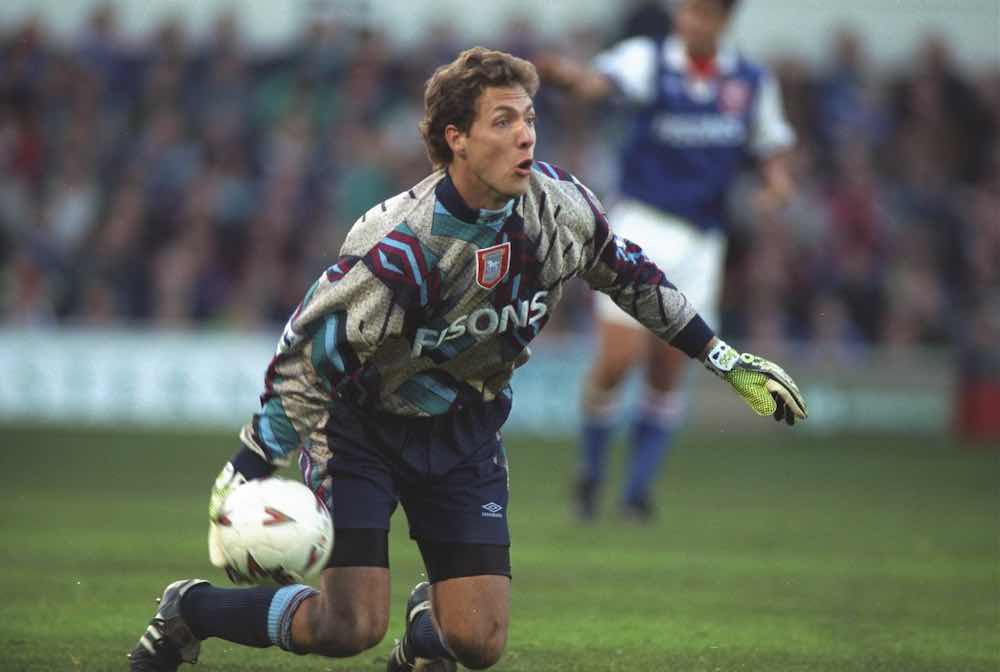
Forrest thus became the first Canadian to play in the Premier League, when he played in the opening day 1-1 draw against Aston Villa at Portman Road. Unfortunately for fellow-countryman Yallop, who went on to make nearly 400 appearances for Ipswich over thirteen seasons, he wasn’t in the match day squad – and otherwise would’ve shared this honour.
It wasn’t all roses for Forrest however. As some of you may remember, he holds the unwanted record of being the goalkeeper on the end of the greatest drubbing in Premier League history – a 9-0 defeat to Man United in 1995. Forrest kept the undesirable accolade until Southampton’s humiliating 9-0 demolition at the hands of Leicester last season.
After a brief loan spell at Chelsea in 1997, where he played alongside legends like Gianfranco Zola and Gianluca Vialli, he moved to West Ham on a permanent basis later that year – making 30 appearances for the Hammers over five years.
Before retiring in 2002 Forrest had racked up 56 international appearances for Canada, or Les Rouges (The Reds), and was inducted into their hall of fame in 2007. He has also named in Canadian Soccer’s all-time XI soccer team, and was inducted into the Canadian Sports Hall of Fame in 2015.
Carrie Serwetnyk
Born in Hamilton, Ontario, Serwetnyk played for Canada from 1986 to 1996. She was one of the first women to make the move abroad in search of greener pastures.
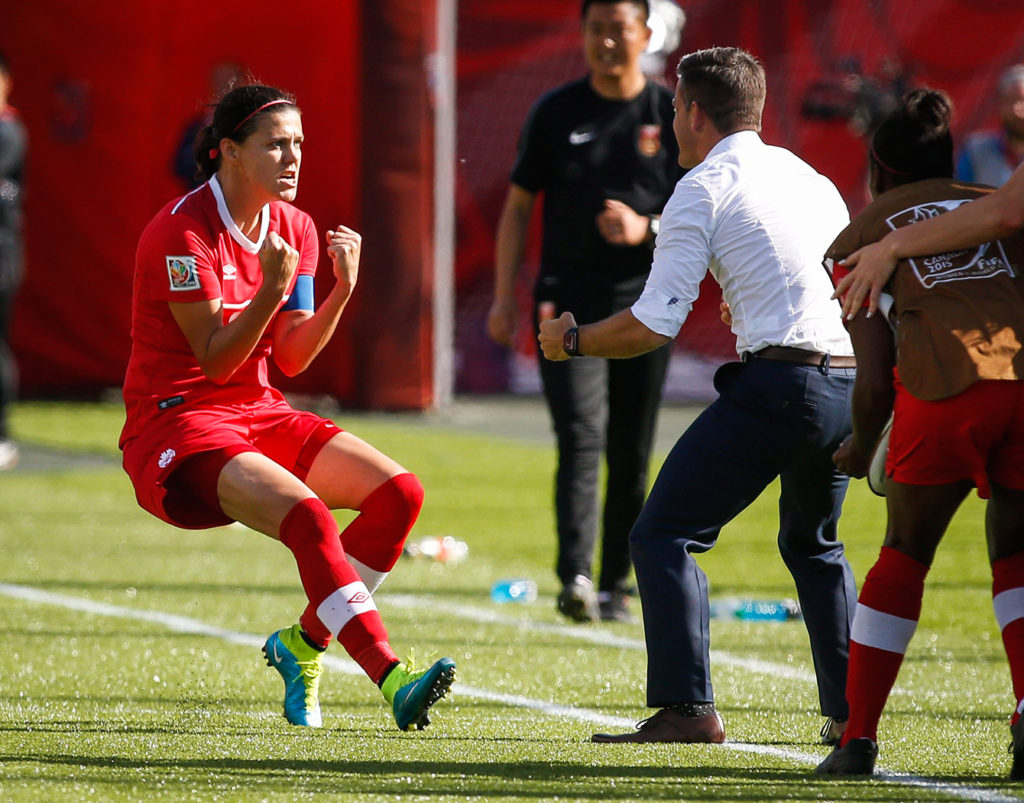
From 1988 to 1990 she played for French side Jeunesse Sportive Féminine de Poissy (AS Poissy) before making a move to Japan in 1992. There she enjoyed spells with Fujita S.C. Mercury, a team owned by the Fujita Corporation, and then Yomiuri Nippon S.C. Ladies.
In 1996 Serwetnyk returned to North America, resuming her career with the Canadian national team after a five year absence. Upon retirement she founded the non-profit organisation Equal Play and also became the first female inductee into the Canadian Soccer Hall of Fame.
Owen Hargreaves
Easily the most familiar name on our list, yet not a Canadian international – it’s funny how life works out sometimes.
Born in Calgary, Alberta, Hargreaves left his local side Calgary Foothills to join Bayern Munich at the tender age of 16. Three years later he made his Bundesliga debut and quickly established himself as a regular in the first team, as well as a firm fan favourite.
Clearly a special talent, it wasn’t long into his European adventure before his international allegiance would be defined. Born to an English father and Welsh mother, Hargreaves, much to the dismay of Canuck fans, chose to play for Wales at U19 level, but switched to England when the U21’s came calling in 2000. He received his first senior England cap in 2001, and went on to earn another 41, appearing at Euro 2004 and the World Cup in 2006.
Hargreaves is the first Canadian to win a major European title, and is the only player to have played for England without having previously lived in the UK.
In a spell spanning eight years he made 150 appearances for Bayern, winning four Bundesliga titles and a Champions League in 2001. He signed for Man United in 2007, and although blighted by knee injuries, helped them to their 2008 Premier League and Champions League titles. A single-appearance stint at fierce rivals City followed, before he retired to a life of punditry in 2012.
Charmaine Hooper
The epitome of a trailblazer in the Canadian women’s game, Hooper was an outstanding talent who was inducted into the Canadian Soccer Hall of Fame in June 2012.
Born in Georgetown, Guyana, Hooper immigrated to Canada via Zambia at the age of nine. In 1993 having been spotted playing for North Carolina State University she moved to Norway, joining Toppserien side FK Donn. A brief spell at Italian club S.S. Lazio followed, before another high-profile move to Japanese side Prima Ham FC Kunoichi in 1994.
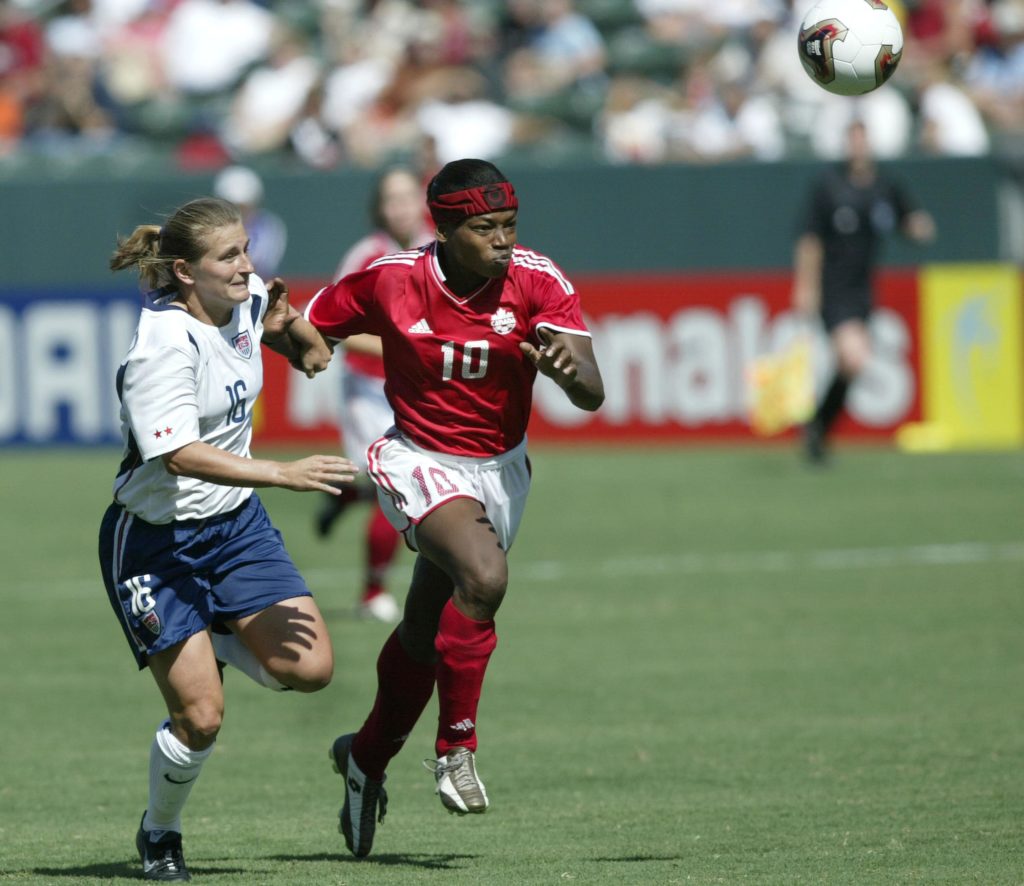
Having won basically every accolade on offer in Japan, she returned to North America in 1995, and represented Canada at three World Cups (Sweden 1995, USA 1999 and USA 2003). She called time on her glittering career in 2008 having played an impressive 129 times for Canada.
The New Millennium of Canada
The turn of the millennium saw another crop of Canadian stars surface at larger and more prestigious club across Europe. With increasingly younger Canadians being snapped up by top European academies, the calibre of Canadian player being produced was taken to a whole new level.
Tomasz Radzinski
Polish-born Radzinski will be quite familiar to Premier League fans. An energetic and clinical striker, he moved to Canada with his family in 1990, beginning his career with the North York Rockets of the Canadian Soccer League.
Radzinski made his return to Europe with Belgian side Germinal Ekeren, before a glamour move to giants Anderlecht materialised in 1998. He was top scorer in the 2000-2001 season, putting in some electrifying performance, most notably in Europe where he scored a brace in Anderlecht’s famous 2-1 win over overwhelming favourites Man United.
Candace Chapman, Tomasz Radzinski named to Canada Soccer Hall of Fame https://t.co/zjKn6rIrA4 pic.twitter.com/CN87byfBPS
— CBC Olympics (@CBCOlympics) May 3, 2018
A move to Premier League side Everton followed in 2001. He would become a fan favourite there, notching up 25 goals in 91 appearances over four season. A three-year spell at Fulham followed in 2004, before he finished out his career in Belgium. He was inducted into the Canadian Soccer Hall of Fame in 2018.
Julian de Guzmán
The elder of the de Guzmán brothers, Julian is the all-time Canadian cap leader and had an outstanding European career by any metric.
Spotted by Marseille scouts at an early age, he made the move to Europe in 1997, but wouldn’t taste first team football until 2001, with German side FC Saarbrücken. A move to Hanover 96 followed in 2002, before a headline-grabbing transfer to La Liga side Deportivo de La Coruña – making him the first Canadian to play in Spain’s top division.
De Guzmán was a massive hit there and was voted Deportivo player of the year for the 2007-2008 season. After his contract expired in the Summer of 2009 he returned to North America where he played for Toronto FC.
Widely recognised as one of Canada’s greatest footballing exports, he retired in 2016 with 89 international caps to his name.
Jonathan de Guzmán
Julian’s baby brother Jonathan will be more familiar to Premier League fans, having plied his trade with Swansea for a couple of seasons.
Two years after his older brother had left for Marseille Jonathan followed in his footsteps, signing for Dutch side Feyenoord’s academy in 1999. By 2005 de Guzmán had become a regular in the first team, notching up 109 appearances, before moving on to Mallorca in 2010.

Though born in Canada to Jamaican and Filipino parents, de Guzmán became a naturalised Dutch during his time at Feyenoord, and lined out for Oranje 14 times in total.
His 2010/2011 season was so outstanding he was signed by, then Champions League mainstays, Villareal. It didn’t quite work out for him at the Spanish side, and he was loaned out to Swansea for two consecutive seasons between 2012-2014.
He was a massively influential figure at the heart of Swansea’s midfield, so much so that Italian giants Napoli came calling, with de Guzmán moving there in 2014. He would endure a tumultuous time in Italy, before moving to German side Eintracht Frankfurt. He is currently a free agent after his contract expired this Summer.
Atiba Hutchison
The only player on this list currently active, Beşiktaş midfielder Hutchison is the definition of stalwart.
Born in Ontario to Trinidadian parents Hutchinson began his career with Canadian Soccer League team York Region Shooters in 2002. In January 2003 he was signed by Swedish top flight team Östers IF and a year later moved to league rivals Helsingborg.
He is one of @CanadaSoccerEN's greatest players.
The @Concacaf legends series continues with Atiba Hutchison.#FloFC
— FloFC (@FloFC_) August 28, 2019
His form did not go unnoticed, and in 2006 he made a big move to perennial Champions League qualifiers FC Copenhagen. Over the course of his four years in Denmark he was linked with a number of Premier League clubs, before signing for PSV Eindhoven in 2010.
He became a regular starter there too, enjoying a successful time which included a KNVB Cup victory in 2011–12. In 2013 he made the move to Turkish side Beşiktaş where he has made over 200 appearances across seven seasons.
The 2020/2021 season will be Hutchinson’s 15th consecutive season in UEFA competitions, a truly outstanding record by any measure. He is certainly one of the most decorated Canadian internationals with 84 caps to his name, and was recognised when he was named to the all-time Canada XI men’s team in 2012.

